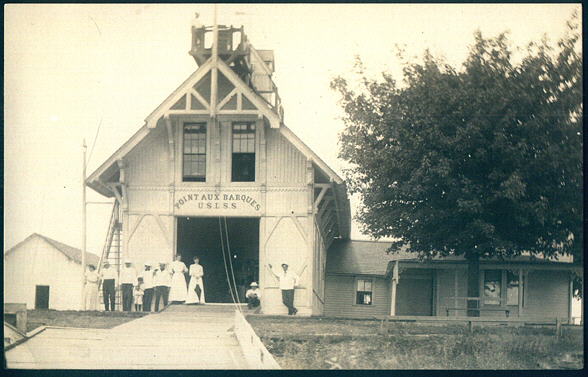
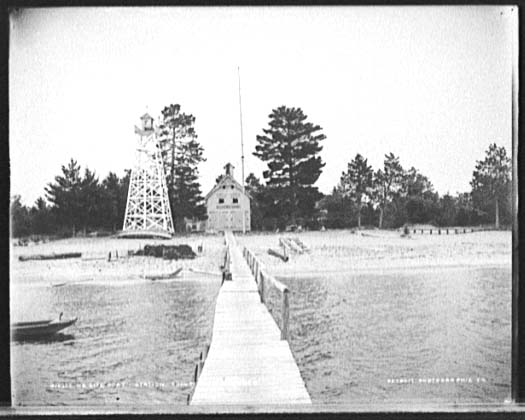
Station
Pointe Aux Barques, Michigan
Coast Guard Station # 248
|
Location: |
1/8 mile
souteast of Point Aux Barques Light, Lake Huron |
|
Date of
Conveyance |
1875 |
|
Station
Built: |
1875 |
|
Fate: |
Turned over to
the GSA in 1956 |
|
Station
Type: |
|
Keepers:
J.H. Crouch was appointed keeper in
1876 and left in 1877 (?)
Charles E. McDonald was appointed
keeper on 12 MAR 1887 and left in 1880 (?)
Jerome G. Kiah
was the keeper in 1880 who lost his life, along with his entire crew, on
23 APR 1880, on an attempted rescue. Click here for more information.
Henry Gill, Jr. was appointed keeper
on 9 JUN 1880 and transferred to [District] Station No. 3 on 28 SEP 1881.
Quinton Morgan was appointed keeper on
28 SEP 1881 and resigned on 14 SEP 1883.
Henry D. Ferris was appointed keeper
on 22 SEP 1883 and transferred to Station Sand Beach on 11 FEB 1898.
John H. Frahm was appointed keeper on
11 FEB 1898 and was still serving in 1915.
After the station was sold off it was
moved to the Huron City complex located to the west of the lighthouse and
south of Port Austin. This is a collection of historical buildings where
tours are offered during the summer months. The life saving station has
been preserved well and contains many artifacts and photographs of the
area. Hopefully the future will hold the same fate of preservation
accomplished here at other stations in Michigan.
Jerome G. Kiah
Gold Medal Awarded 8 November 1880
The gratifying record of so many human
lives preserved also has the sad obverse of loss. On 23 April 1880 the
crew of Station No. 2, Tenth District (Point-aux-Barques, MI), one of the
most gallant and skillful crews in the service, lost six of seven members.
It is the second time in its history that the establishment had had to
mourn the loss of a life-saving crew. The first instance was at the wreck
of the Italian bark Nuova Ottavia on the coast of North Carolina in
1876. This latter tragedy, however, had a great degree of uncertainty
regarding what caused the deaths of the crewmen. The Point aux Barques
disaster, on the other hand, is fully known through the evidence of a
single survivor, and the calamity in all its details can be recounted.
Nothing could be sadder than the story of this sacrifice. It is here given
in the report of the district superintendent, who immediately visited the
locality and investigated the circumstances.
"I arrived at Sand Beach the evening
of the 24th, and learned there that the life-saving crew were lost in
their attempt to reach a vessel in distress off their station, and that
the vessel had afterwards got out of trouble and was then lying at the
breakwater at Sand Beach. As the steamer on which I was going up was to
remain there a little while, I went out and saw the master of the vessel
and got his statement, which is substantially as follows:
"‘I am the master and owner of the
scow J.H. Magruder, of Port Huron. Her tonnage is 136.71. The crew
consists of myself and four men, namely, Frank Cox, Thomas Purvis, Eddy
Hendricks, and Thomas Stewart. I have my wife and two little children
aboard. I left Alcona with a load of 187,000 feet of lumber for Detroit at
noon the 22nd instant, wind north, fresh. Sighted Point aux Barques light
at ten o’clock that night, wind east, light, but breezing up. Took
gaff-topsails in at eleven o’clock. When abreast of light we commenced
listing bad to starboard. Saw we were making great leeway and the lee rail
under water. Discovered here, for the first time, that the vessel was
leaking badly, with two feet of water in the hold. About midnight was
laboring very heavy, with high wind and heavy sea. I feared we would roll
over, and was satisfied we could not weather the reef. Got both anchors
ready and let go about 2 AM the 23rd, when she immediately righted. Had
fourteen feet of water under the stern, and at every heavy surge on the
chains she would drag anchor, the seas breaking over her bows. Hung a red
light in main rigging, as a signal of distress to the life-saving station.
I certainly feared the vessel would be lost, and that our lives were in
great danger, if assistance was not rendered. The vessel would strike
bottom between every heavy sea. At daybreak I displayed my ensign at
half-mast, union down, and about 7:30 AM observed the answering signal
from the station. About eight o’clock saw the surfboat coming out. We were
about three miles southeast from the station. Lost sight of surfboat in a
few moments; thought the sea was too heavy for her, and that she had gone
back, but in about 1.5 hours (9:30) saw her again about one mile north of
us, pulling to the eastward, to get out of the breakers on the reef. In a
short time I saw her go down in the troughs of a heavy sea, and when she
came up we saw she had capsized. We saw them right her and bail out, when
she again started to pull for us. In about twenty minutes she again
capsized. Saw several men clinging to her, for some time, but finally saw
only one. Our boat was in good condition. She is 16 feet long. Did not
think of launching her. No ordinary yawl-boat could live in such a sea. I
thought the life-saving crew used good judgment in crossing the reef where
they did. I then commenced throwing my deck-load overboard, and at noon,
the wind shifting to the northeast, we made all sail and started, cleared
the reef, and arrived in Sand Beach all safe, but leaking badly. The
weather was piercing cold, and all that day the spray would freeze as it
came aboard of us.’"
The superintendent continues:
"I arrived at Huron City at one
o’clock Sunday morning (25th). The two dead bodies of surfmen Petherbridge
and Nantau were put aboard of the steamer here, and sent down to Detroit,
by direction of their friends. I arrived at the station at 3 AM, and found
Keeper Kiah in a very bad condition, both mentally and physically. The sad
story of his experience, and the loss of his brave crew, is as follows:
"‘A little before sunrise on the
morning of the 23d, James Nantau, on watch on the lookout, reported a
vessel showing signal. I got up, and saw a small vessel about three miles
from the station, bearing about east and by south. She was flying
signal-of-distress flag at half-mast. I saw that she was at anchor close
outside the reef. All hands were immediately called; ran the boat out on
the dock; and, when ready to launch, Surfman Deegan, on patrol north, came
running to the station, having discovered the vessel from McGuire’s Point,
1.5 miles north from the station. At this time a warm cup of coffee was
ready, of which we all hastily partook, and a little after sunrise (5:15
by our time) we launched the boat. Wind east, fresh, sea running
northeast, surf moderately heavy. We pulled out northeast until clear of
the shore surf, and then I headed to cross the reef where I knew there was
sufficient water on it to cross without striking bottom. ‘We crossed the
reef handsomely, and found the sea outside heavier than we had expected,
but still not so heavy as we had experienced on other occasions. After
getting clear from the breakers of the reef, the boys were in excellent
spirits, and we were all congratulating ourselves how nicely we got over.
I then bore down towards the vessel, heading her up whenever I saw a heavy
sea coming. When heading direct for the vessel, the sea was about two
points of the compass forward of our port beam, and for the heaviest seas
I had frequently to head the boat directly for, or dodge them. When about
a quarter of a mile from the vessel, and half a mile outside the reef, and
very nearly one mile from the nearest point of land, I saw a tremendous
breaker coming for us. I had barely time to head her for it, when it broke
over our stern and filled us. I ordered the boys to bail her out before
the sea had got clear of her stern, but it became apparent at once that we
could not free her from water, as the gunwales were considerably under
water amidships, and two or three minutes after she was capsized. We then
righted her, and again were as quickly capsized. We righted her a second
time, but with the same result. I believe she several times capsized and
righted herself after that, but I cannot distinctly remember. As near as I
can judge, we filled about one hour after leaving the station. For about
three-quarters of an hour we all clung to the boat, the seas occasionally
washing us away, but having our cork jackets on, we easily got back again.
At this time Pottenger gave out, perished from cold, dropped his face in
the water, let go his hold, and we drifted slowly away from him. We were
all either holding on the lifelines or upon the bottom of the boat, the
latter position difficult to maintain owing to the seas washing us off.
Had it been possible for us to remain on the bottom of the boat, we would
all have been saved, for in this position she was buoyant enough to float
us all clear from the water. My hope was that we would all hold out until
we got inside the reef where the water was still. I encouraged the men all
I could, reminded them that there were others, their wives and children,
that they should think of, and to strive for their sakes to keep up, but
the cold was too much for them, and one after another each gave out as did
the first. Very little was said by any of the men; it was very hard for
any of us to speak at all. I attribute my own safety to the fact that I
was not heated up when we filled. The men had been rowing hard and were
very warm, and the sudden chill seemed to strike them to the heart. In
corroboration of this theory I would say that Deegan, who did the least
rowing, was the last to give out. All six perished before we had drifted
to the reef. I have a faint recollection of the boat grating or striking
the reef as she passed over it, and from that time until I was taken to
the station, I have but little recollection of what transpired. I was
conscious only at brief intervals. I was not suffering, had no pain, had
no sense of feeling in my hands, felt tired, sleepy, and numb. At times I
could scarcely see. I remember screeching several times, not to attract
attention, but thought it would help the circulation of the blood. I would
pound my hands and feet on the boat whenever I was conscious. I have a
faint recollection of when I got on the bottom of the boat, which must
have been after she crossed the reef. I remember too in the same dreamy
way of when I reached shore; remember of falling down twice, and it seems
as if I walked a long distance between the two falls, but I could not have
done so, as I was found within thirty feet of the boat. I must have
reached the shore about 9:30 AM, so that I was about 3.5 hours in the
water. I was helped to the station by Mr. Shaw, lightkeeper, and Mr.
McFarland; was given restoratives, dry clothes were put on, my limbs were
dressed, and I was put to bed. I slept till noon (two hours), when my wife
called me, saying that Deegan and Nantau, had drifted ashore, and were in
the boatroom. My memory from this time is clear. I thought possibly these
two men might be brought to life, and, under my instructions, had Mr. Shaw
and Mr. Pethers work at Deegan for over an hour, while I worked over
Nantau for the same time, but without success. I then telegraphed to the
superintendent and the friends of the crew. The four other men were picked
up between 1 and 2 PM, all having come ashore within a quarter of a mile
from the station. The surfboat and myself came ashore about one mile south
of the station, the bodies drifting in the direction of the wind, and the
boat more with the sea. I ordered coffins for all. On the 24th, Hiram
Walker, of Detroit, telegraphed to ship the bodies of Petherbridge and
Nantau to Detroit, which I did, together with their effects. The other
four men were delivered to their friends, all residents of this county.
"‘The following are the names of the
lost crew: William I. Sayres, Robert Morison, James Pottenger, Dennis
Deegan, James Nantau, and Walter Petherbridge. Sayres and Morison were
widowers. Sayres leaves five children, the youngest eight years old.
Morison leaves three children, the youngest six years old. This would be
the third season for these two men at the station. Pottenger and Deegan
each leave a wife and four children, the youngest two months old each.
This was the second season for these two men at the station. Nantau and
Petherbridge were single men, and this was their first season at the
station.’
"Mr. Samuel McFarland makes the
following statement:
"’I am a farmer, and was working on
the farm about one-fourth of a mile from where the surfboat came ashore,
when I heard gulls screeching, as I supposed, several times, but paid no
attention to it. Presently my two dogs started to run for the cliff, and
thinking that somebody might be calling from the shore, I went to the edge
of the high cliff overlooking the lake, and saw a boat bottom up about 100
rods from shore, with one man on it. Not knowing that the station crew
were out, started to notify them of what I saw. Upon getting to the
station, about 9 o’clock, and learning that they were out, concluded it
was the surf-boat I had seen, and went to the light-house after Mr. Shaw
to accompany me to where the boat was drifting in. When we got there the
boat was ashore, and Captain Kiah was standing on the beach about 30 feet
from the boat, with one hand holding on to the root of a fallen tree, and
with the other hand steadying himself with a lath-stick, and swaying his
body to and fro, as if in the act of walking, but not stirring his feet.
He did not seem to realize our presence. His face was so black and
swollen, with a white froth issuing from his mouth and nose, that we did
not at first know who he was. We took him between us, and with great
difficulty walked him to the station. Several times on the way he would
murmur, "Poor boys, they are all gone." At one time he straightened out
his legs, his head dropped back, and we thought he was dying, but he soon
recovered again. Upon reaching the station he was given restoratives, his
clothes were removed, and he was put to bed. His legs from above the knees
were much swollen, bruised and black.’
"Mr. Shaw corroborates this statement
from the time he took part in it.
"I attended the funerals of Deegan and
Pottenger, the 25th, and hope I may be spared from ever again witnessing
so sad a scene. The wives of these two brave men were almost crazed by
their great loss, and the cries of the poor children left fatherless, were
heart-rending in the extreme. It is sincerely to be hoped that the bill
now pending in Congress, granting pensions to the families of surfmen who
lose their lives in the discharge of their duty, will become a law, so
that the families of these truly brave men may be compensated to the
extent of its provisions.
"In conclusion, I would state that I
feel very keenly the loss of this crew, but I can lay the blame at no
one’s door. It was one of those unfortunate accidents that are liable to
occur with the best of men and under the best management, but not likely
to occur twice in a lifetime. Had the boat been two seconds earlier or
later, the sea would have broken ahead of her, or she would have passed
over it before breaking; but upon straightening up the boat there was no
time left to back or dodge. The sea broke when she lay in the most
critical position to take it. Certainly it was the duty of the crew to
answer to the signal of distress, and certainly they responded most
promptly. There was no discord here; there was more than a friendly
feeling existing between the keeper and crew. They had together made a
good record at their station, and when duty called each strove to be
foremost in the boat.
* * *
"I have conversed with several who
have served with Keeper Kiah, and all speak in the highest praise of him
as a man, and of his superior skill in handling a surf-boat. He has the
sympathy of the entire community, including the friends and relatives of
his dead crew, in his present trouble."
The closing incident in the Point-aux-Barques
tragedy was the resignation of the stanch keeper, too shattered in mind
and body, for the time at least, to retain his position. Thus the heroic
station was by a day’s experience left at once vacant of its crew, who,
this very year, had saved nearly a hundred lives.
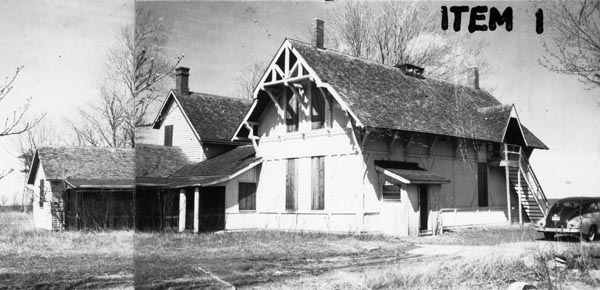
The end of an era, the old station boarded up, abandoned and thrown
away. Luckily when it was sold from the government it was saved. Today it
is fully restored and sits proudly in Huron City on display for all to
see.
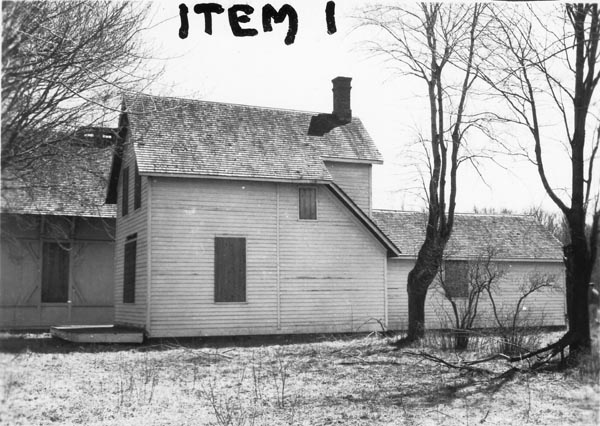
Side view of the abandoned station.
|
|
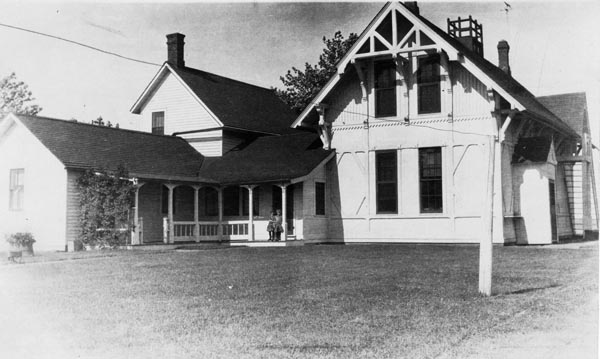
Close up rear view of the station house.
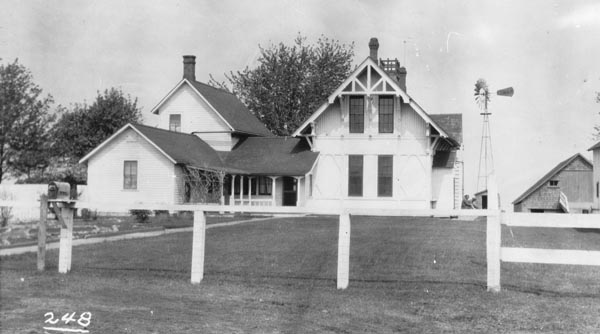
Further away shot of the rear of the station after the road was put in.
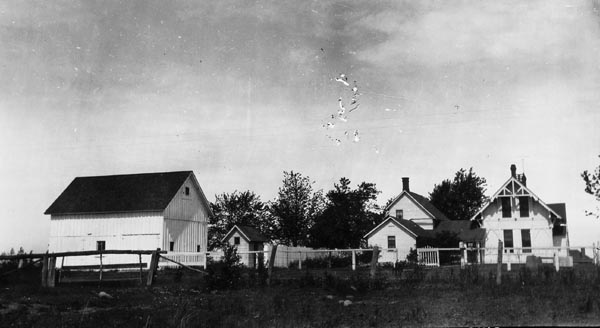
Rear view of the station house complex.
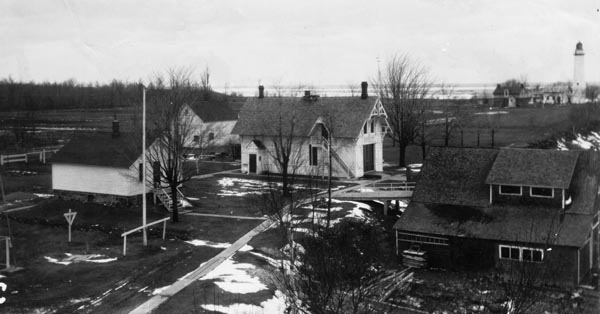
A view toward the lighthouse from the lookout tower.
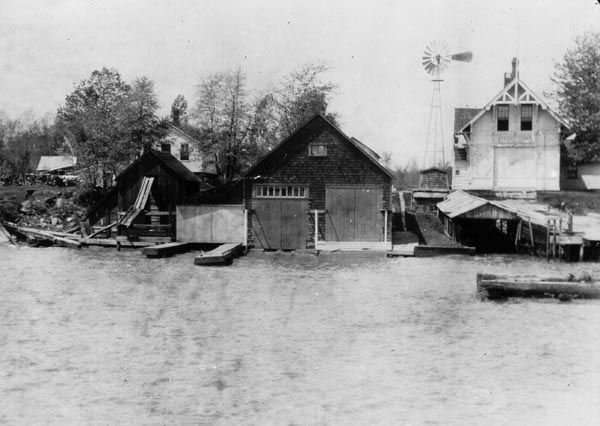
An earlier shot of the station with windmill.
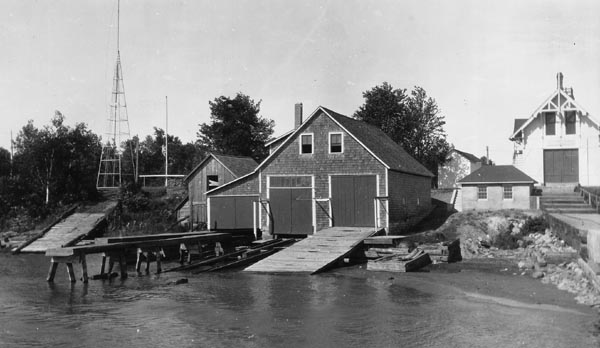
Close up of the boat house, carpenters shop and station. Notice there is
no windmill present in this shot like the one above.
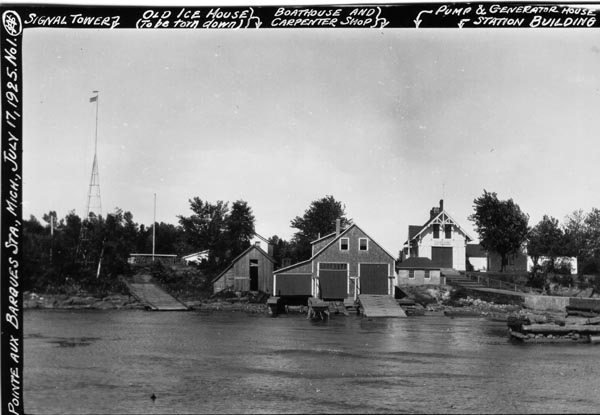
A front view of the station. 1925 photo.
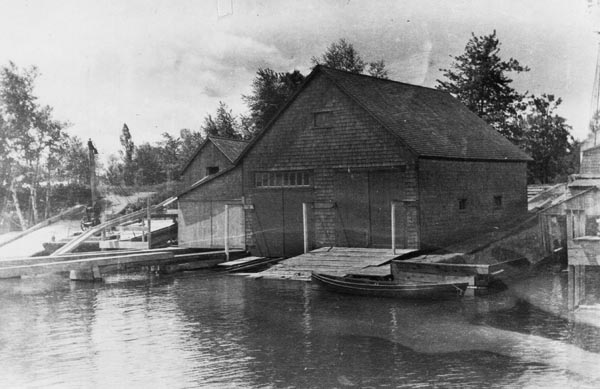
Close up of the boat house and carpenters shop.
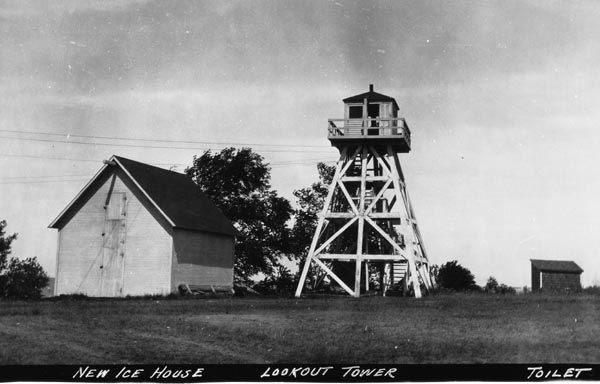
Old lookout tower with the newly constructed Ice House.
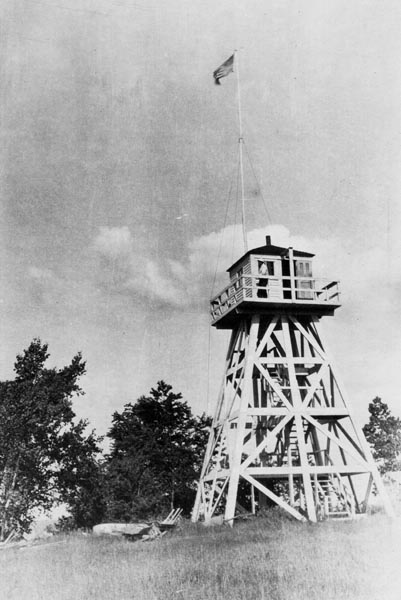 The old original
lookout tower.
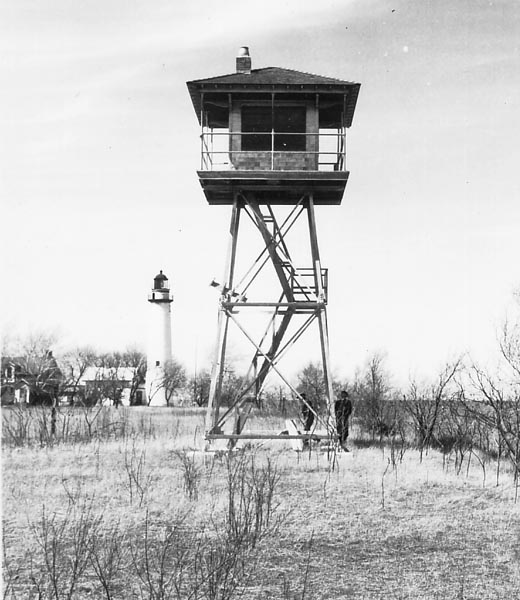
The newer lookout tower.
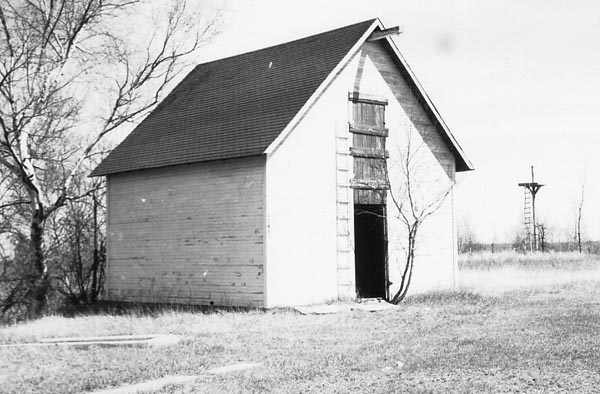
The ice house in later years, note the lookout tower is no longer present.
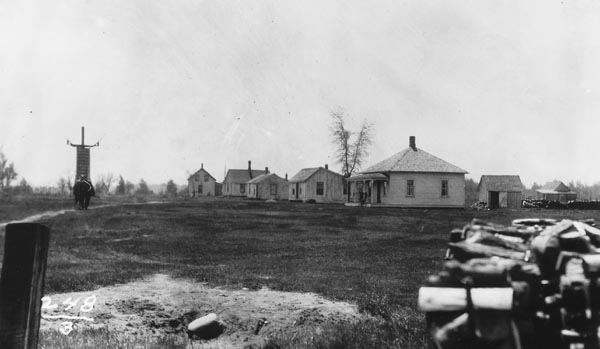
The surfmen's houses
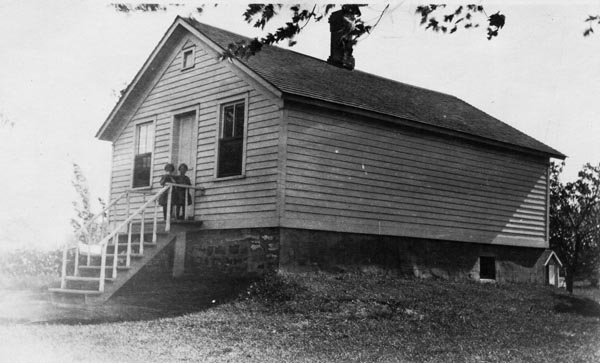
Close up of one of the surfmen's houses.
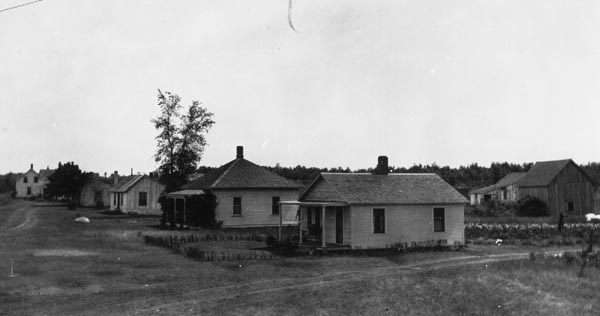
Surfmen's housing.
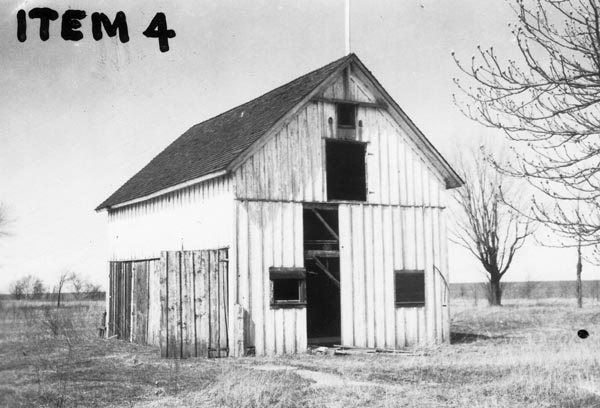
The abandoned barn.
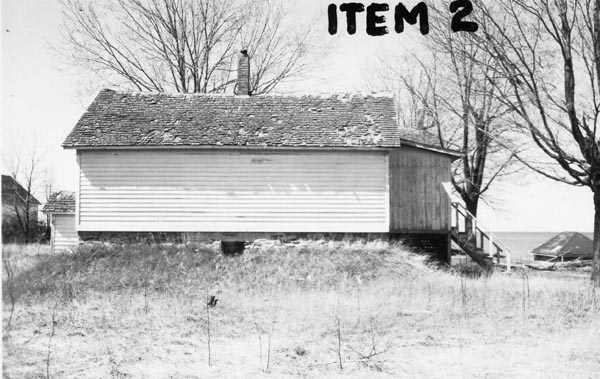
Crews dormitory in ruins. |